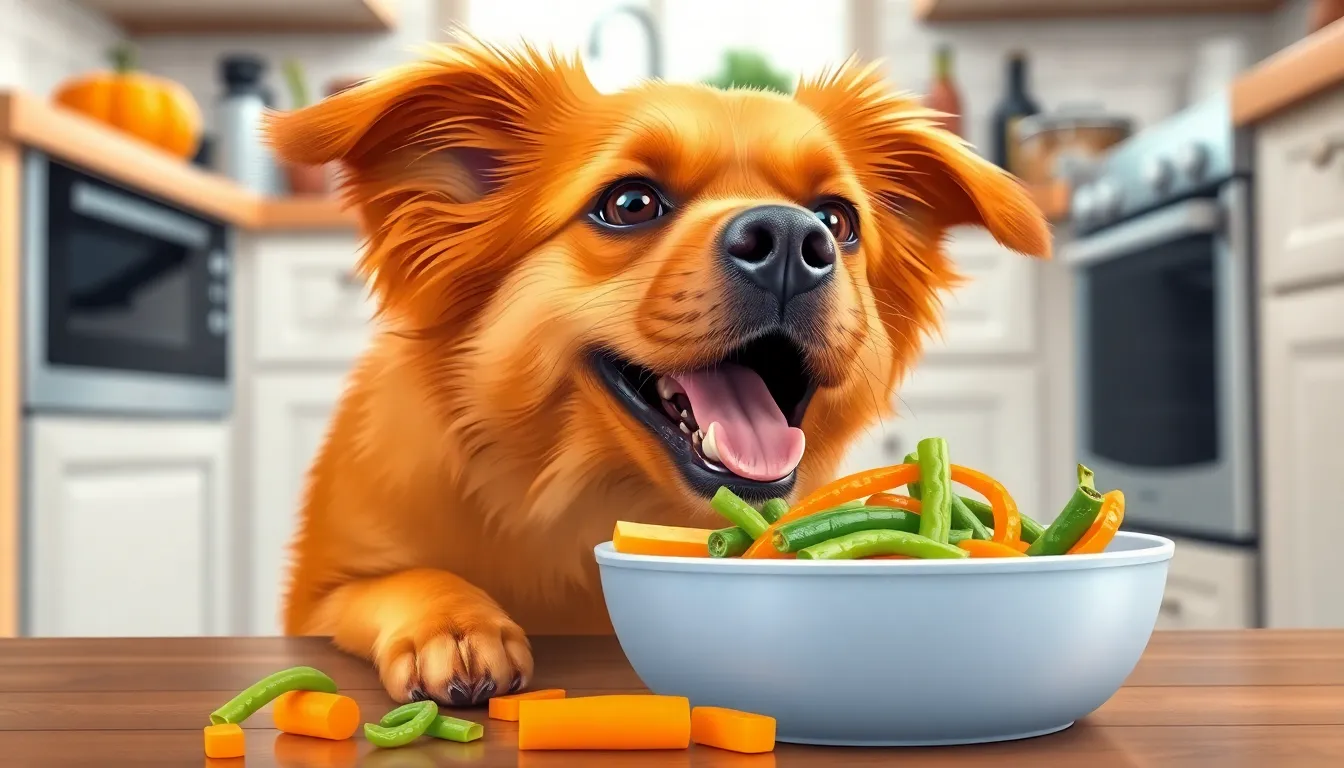When a dog’s belly is in distress, it’s no laughing matter—unless you count the awkward dance they do while trying to find relief. Constipation in dogs can turn your furry friend into a grumpy pup, and let’s face it, nobody wants to deal with a moody canine. Fortunately, there are plenty of ways to help them get back to their tail-wagging selves.
Table of Contents
ToggleUnderstanding Dog Constipation
Dog constipation can lead to discomfort and irritability. Recognizing the issue early aids in returning a dog to its joyful state.
Causes of Constipation in Dogs
Diet plays a significant role in a dog’s digestive health. Low-fiber foods may lead to hard stools and difficulty passing them. Dehydration can also contribute, as insufficient water intake slows down intestinal movement. Sedentary behavior influences bowel regularity too, as dogs that do not exercise enough may experience constipation. Additionally, underlying health issues such as anal gland problems or intestinal blockages can lead to this condition. Age matters as well; older dogs often have slower metabolisms, increasing the likelihood of constipation.
Symptoms to Watch For
Noticing symptoms can help identify constipation. Difficulty defecating often manifests as straining or frequent attempts without results. Dry, hard stools indicate a problem, as healthy stools should be softer. Changes in appetite may occur; dogs may show decreased interest in food or water. Abdominal discomfort might present itself, causing a dog to whine or become restless. Furthermore, lethargy can reflect how a dog feels when struggling with constipation. Awareness of these signs enables timely intervention and care for the dog’s well-being.
Dietary Solutions

Diet plays a crucial role in managing constipation in dogs. Proper nutrition can significantly improve their digestive health and overall well-being.
Importance of Fiber in a Dog’s Diet
Fiber aids in maintaining healthy bowel movements. It adds bulk to the stool, making it easier for dogs to defecate. Adequate fiber intake prevents dehydration in the digestive system, promoting regularity. Dogs require a balance of soluble and insoluble fibers for optimal digestion. Increasing fiber gradually can prevent digestive upset. Fiber-rich diets encourage beneficial gut bacteria, enhancing digestion.
Recommended High-Fiber Foods
Several high-fiber foods benefit dogs suffering from constipation. Pumpkin offers a natural source of fiber, promoting healthy digestion. Sweet potatoes serve as another excellent choice due to their fiber content and nutritional value. Green beans provide essential nutrients and fiber without adding excessive calories. Apples, without seeds, add variety to the diet and enhance fiber intake. Whole grains such as brown rice and oats contribute to overall digestive health. Consulting a veterinarian prior to making dietary changes ensures the best outcomes for dog health.
Hydration and Its Role
Hydration plays a crucial part in alleviating constipation in dogs. It impacts the overall digestive health and helps maintain regular bowel movements.
Ensuring Adequate Water Intake
Providing ample access to fresh water is essential for dogs. Encourage regular drinking throughout the day to prevent dehydration. A dog’s weight can influence its water needs, with larger breeds requiring more. A general guideline suggests that dogs should drink about one ounce of water per pound of body weight daily. Monitoring water consumption helps identify potential issues, as decreased intake might indicate health concerns. Adding water to their food can further enhance hydration levels, especially in dogs that are reluctant to drink.
Benefits of Broths and Soups
Incorporating broths and soups can boost hydration for dogs. Homemade or low-sodium options are ideal for adding flavor while ensuring essential nutrients. These liquids provide hydration and can stimulate appetite, particularly for dogs struggling with digestive issues. Broths containing ingredients like carrots or chicken not only enhance taste but may also offer additional nutrients. Using these warming liquids can make meal times more enjoyable and encourage dogs to consume more fluids.
Physical Activity and Wellness
Physical activity plays a vital role in promoting digestive health in dogs. Regular exercise enhances gut motility, encouraging bowel movements and helping alleviate constipation.
Impact of Exercise on Digestive Health
Exercise significantly influences digestion in dogs. Increased physical activity reduces stress, which can contribute to constipation. A dog that engages in daily walks or playtime experiences improved blood circulation, promoting digestive function. Moreover, active dogs tend to have better overall muscle tone, which supports healthy bowel movements. By fostering regular activity habits, owners can help maintain their dog’s digestive efficiency.
Recommended Activities for Your Dog
Several activities effectively boost a dog’s physical activity levels. Daily walks offer a straightforward way to get a dog moving and can include varying lengths based on the dog’s fitness level. Playing fetch encourages bursts of energy and excitement, benefiting both the dog’s mood and digestion. Engaging in agility training or obstacle courses builds strength while entertaining dogs. Swim sessions also provide excellent cardiovascular exercise without overexertion. Varied routines promote both physical health and mental stimulation, essential for a happier, healthier dog.
When to Consult a Veterinarian
Recognizing when to seek veterinary help for a dog with constipation is crucial. Certain signs indicate a need for immediate attention.
Signs That Require Immediate Attention
If a dog shows persistent or severe difficulty defecating, that warrants a trip to the veterinarian. Symptoms such as vomiting, lethargy, or abdominal swelling also require prompt evaluation. Additionally, if a dog hasn’t had a bowel movement in over 48 hours, this can signify a more serious issue that needs addressing. Unusual behavioral changes, including hiding or avoiding interactions, may indicate discomfort that necessitates expert care. Lastly, if a dog experiences blood in the stool or rectal tearing, immediate veterinary attention is essential to prevent further complications.
Potential Medical Treatments
Veterinarians often recommend various medical treatments for constipation in dogs. A physical examination and diagnostic tests can help identify underlying health issues contributing to the constipation. Based on the findings, a vet might suggest prescription medications that enhance bowel motility or alleviate blockage. Furthermore, in some cases, enemas administered by a professional can provide immediate relief. Surgical intervention may become necessary if an obstruction persists despite other treatments. Always consult a veterinarian before applying any medical treatments to ensure the safety and health of the dog.
Addressing constipation in dogs is essential for their overall health and happiness. By focusing on proper nutrition hydration and regular exercise owners can significantly improve their dog’s digestive health. Recognizing the signs of constipation early allows for timely intervention and care. When in doubt or if symptoms persist a veterinarian’s guidance is invaluable. With the right approach dogs can return to their playful selves and enjoy a better quality of life. Prioritizing these aspects not only alleviates constipation but also fosters a stronger bond between dogs and their owners.




